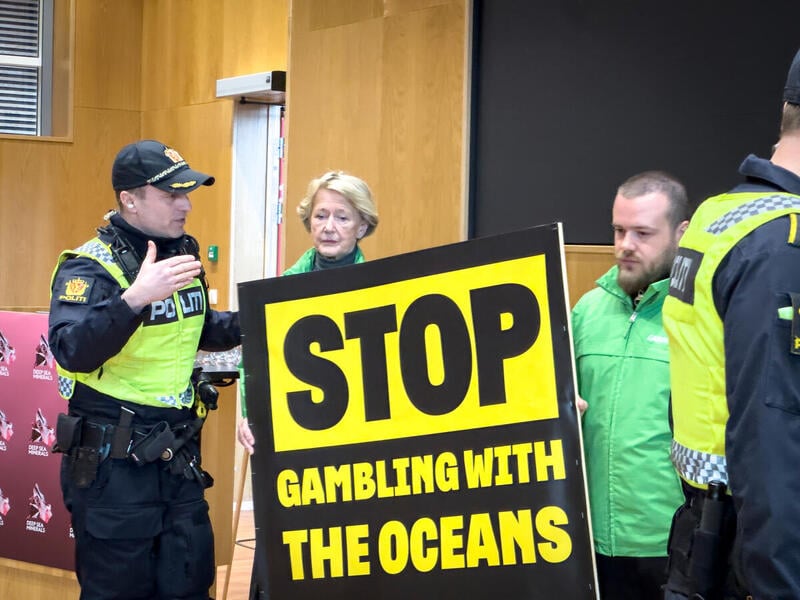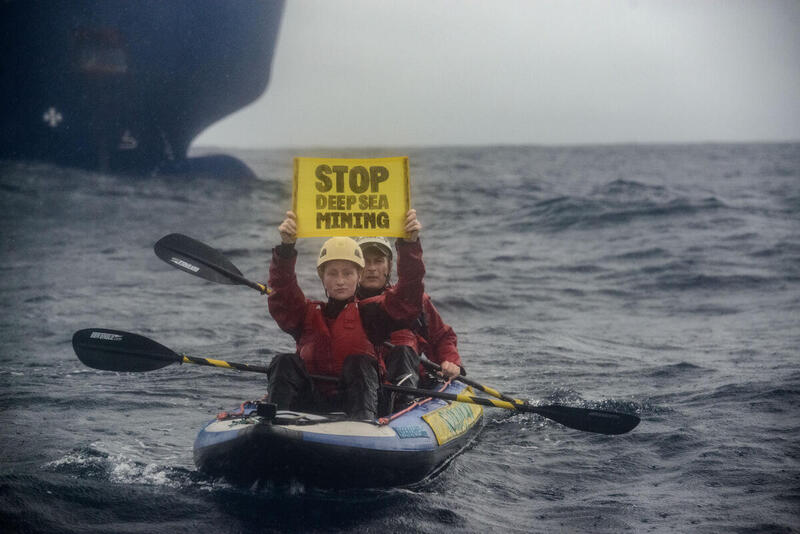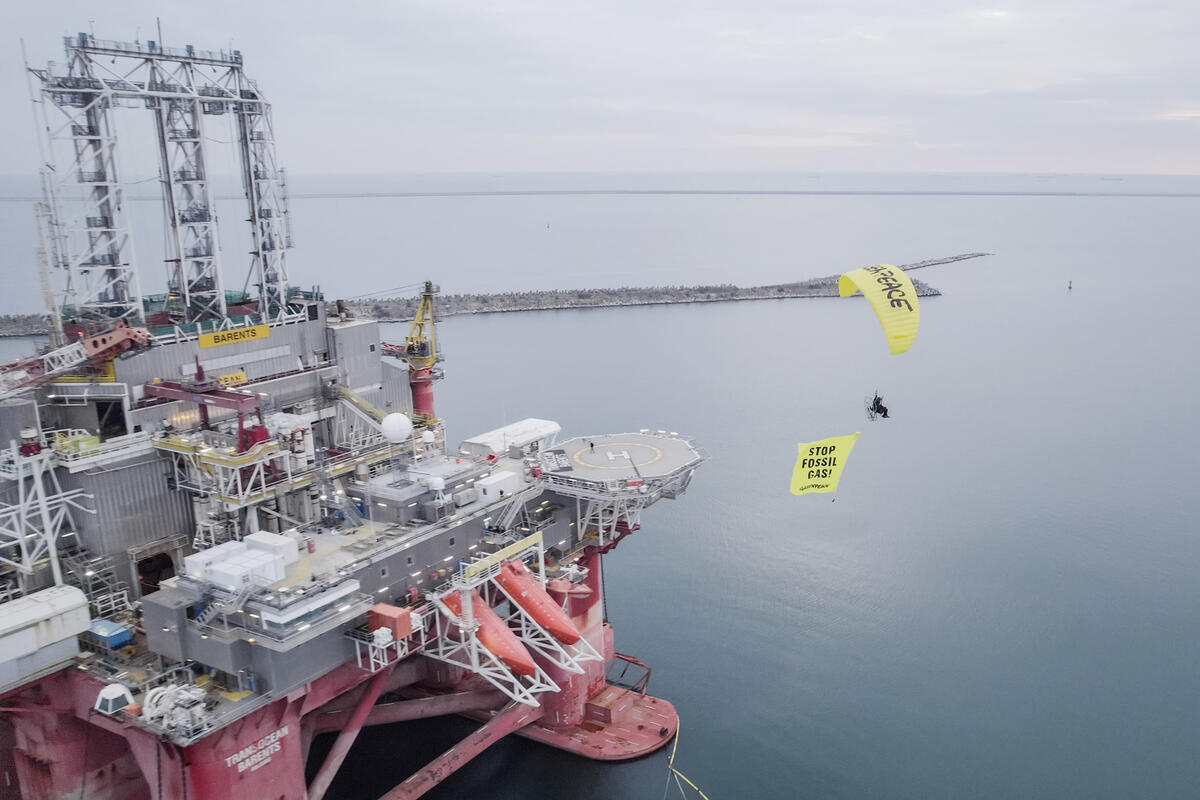The Gulf of Thailand’s EEZ – Activists from Greenpeace flagship Rainbow Warrior conducted a peaceful banner protest against a proposed offshore carbon capture and storage(CCS) site at the Arthit fossil gas field located in the Gulf of Thailand’s exclusive economic zone[1] to highlight the fossil industry’s greenwashing.
Greenpeace Thailand campaigner, Alliya Moun-Ob on board the Rainbow Warrior said, “With my own eyes, I can see the proposed CCS project at fossil gas field is doing nothing to do with a low-carbon pathway, but a license for the one of the biggest climate polluters in Thailand, PTT Exploration and Production Public Co Ltd (PTTEP), to continue killing our climate and making a lot of profit. We urged the Thai government to make polluters pay and to reform climate policy in such a way that it embraces a wide range of non-market-based solutions and approaches that are focused on people, and moves beyond carbon offset markets. We called on PTTEP to hold it accountable for its contribution to the climate crisis by stopping this carbon capture and storage plan immediately.”
The Arthit fossil gas field is operated by PTTEP[2][3], which is a joint-venture with Chevron. It will be the site of Thailand’s first offshore carbon capture and storage project[4] and among at least 57 proposals for offshore carbon sequestration worldwide representing a new threat to the world’s oceans and a dangerous distraction from real progress on climate change.[5] As outlined in its proposal, the project is designed to be a component of its ongoing offshore gas extraction. Between 700,000 and 1 million tons of CO2 per year would be separated from produced gas, then compressed and re-injected under the seabed for storage in saline aquifers and depleted gas fields.[6] A tremendous amount of energy is needed for each stage, along with potentially various risks to the marine ecosystem.[7]
Thailand promotes itself as the regional hub for energy trading, allowing other countries to utilise its fossil gas-heavy power grid for cross-border trades. As fossil gas sources brought to land via pipelines controlled by PTTEP’s mother company, PTT from both the gulf of Thailand and Myanmar are depleting fast, Thai policy makers have chosen to lock-in the country’s energy system with costly and volatile imported liquid fossil gas. A study by Climate Finance Network Thailand (CFNT) indicates that Thailand is at a considerable financial risk of its fossil fuel infrastructure becoming stranding assets in the future.[8][9]
Those who advocate for Southeast Asia to transition to a clean renewable energy system are growing increasingly concerned about Thailand’s reliance on fossil gas, according to Yeb Sano, the Executive Director of Greenpeace Southeast Asia who is also onboard the Rainbow Warrior.
Sano argues,“Thailand’s position as a regional energy hub has the potential to influence neighboring countries. Moreover, the climate and biodiversity crises have had and will persistently have catastrophic impacts on Thai society and the rest of Southeast Asia. Addressing those threats through carbon capture and storage is completely wrong and aggravates climate injustice.”
Nichanan Tanthanawit, the Project Lead for the Ocean Justice Campaign at Greenpeace Southeast Asia, said, “Our seas and oceans have already encountered a variety of existing pressures, including destructive fishing, acidification, marine heatwave, and the spread of microplastics. The global burden on the thriving oceans would be further exacerbated by offshore carbon capture and storage.”
A month-long Ocean Justice Ship Tour in Thailand concluded with a peaceful protest at sea. Greenpeace Thailand has been conducting research in Pathio, Chumphon province as well as Chana, Songkhla province, in collaboration with coastal communities to support communities-led marine protected areas and other effective area-based conservation measures (OECMs). False solutions such as carbon capture and storage (CCS), fossil gas projects, and offshore fossil fuel extractions would endanger these regions and must be stopped at all cost.
Photo and Video can be found in the Greenpeace Media Library.
ENDS
Contact:
Wiriya Kingwatcharapong, Communications and Digital Manager, Greenpeace Thailand, +66 91 770 3523, [email protected]
Somrudee Panasudtha, Media Campaigner, Greenpeace Thailand, +66 81 929 5747, [email protected]
Notes:
[1] Arthit fossil gas and condensate field is located 230-250 km offshore of Thailand’s Songkhla province. It covers an area of 4,185km² across five concession blocks – B14A, B15A, B16A, G8/50 and G9/48. The field lies at a water depth of 262ft (80m). PTT Exploration and Production Public Co Ltd (PTTEP) is the operator of the field, holding 80% interest. Partners include Chevron Thailand (16%) and Mitsui Oil Exploration Company (MOECO) Thailand (4%). PTTEP and Chevron to call for Thailand Arthit Field Development – 2B1stconsulting
[2] PTT Exploration and Production Public Co Ltd aka PTTEP, a subsidiary of PTT Public Company Limited, is an oil and gas company engaged in exploration, development, and production of hydrocarbons. It also produces natural gas liquids (NGL) such as LPG and condensate. Managing a diverse portfolio of exploration projects worldwide, PTTEP operates pipelines for fossil gas transportation from its overseas projects. With operations spanning Australia, the Americas, Africa, the Middle East, and Asia, PTTEP is headquartered in Bangkok, Thailand. PTTEP has also been a key player among “Big Oil” – Chevron (U.S.), TotalEnergies (France), and POSCO (South Korea) in Myanmar’s major offshore fossil gas projects. These multinational companies extract fossil gas from offshore facilities and primarily transport it through pipelines to China and Thailand. Revenues from Myanmar’s offshore fossil gas projects are the military junta’s largest source of foreign revenue. In 2022, PTTEP looks set to take over Myanmar’s biggest gas field, as TotalEnergies and Chevron Corp exit in the wake of military coup. PTTEP’s infamous track records include Montara Oil Spill in 2009 and corruption, collusion, and bribery in connection to the Arthit Offshore Gas Field Project in 2024. Its parent company, PTT Public Company Limited, involved the Rayong oil spill in 2013.
[3] It is linked to the Long-term Low Greenhouse Gas Emissions Development Strategy (LT-LEDS), also known as the “Thailand Net Zero Roadmap,” which says that fossil-based power plants equipped with carbon capture and storage are being looked at in order to reach net zero GHG emissions by 2065. Reported by Carbon Majors, PTTEP is ranked 96th of 122 of the world’s largest oil, gas, coal, and cement producers.
[4] The Arthit Central Processing Platform is the biggest offshore fossil gas platform in Southeast Asia, weighing 17,000 tonnes. It was constructed in Batam Island, Indonesia, and features fossil gas processing facilities. Arthit Central Processing Platform Spec Sheet
PTTEP initiated Thailand’s First Carbon Capture and Storage project at Arthit fossil gas and condensate field in the gulf of Thailand, expecting to offset CO2 emission by approximately 700,000-1,000,000 tons per year. PTTEP expects to execute CCS technology at Arthit fossil gas field in 2027.
[6] PTTEP. (2015). Carbon Capture and Storage (CCS) Project (Issue September, pp. 1–6)
[7] Offshore CO₂ leakage could alter ocean chemistry, threatening the environment and endangering marine life and human health, see Simulations of Subsea CO2 Leakage Scenarios – SINTEF. High levels of CO₂ can damage marine ecosystems by altering the body fluid chemistry of fish and impairing their ability to breathe, see Global declines in coral reef calcium carbonate production under ocean acidification and warming – PNAS. The acidification of seawater results from an increased concentration of hydrogen ions and a reduction of bicarbonate ions due to high CO₂ absorption, see CO2 and Ocean Acidification – Union of Concerned Scientists. Changes in ocean chemistry caused by CO₂ leakage on a CCS plant may profoundly affect calcareous organisms such as corals, shellfish, and specific phytoplankton groups. Effects of disturbed calcification rates due to the change in water pH may include reduced growth and reproduction levels and increased mortality rates, see and Carbon Capture and Storage in Sub-Seabed Geological Formations – National Oceanic and Atmospheric Administration and Global declines in coral reef calcium carbonate production under ocean acidification and warming – PNAS.
[8] Fossil Reckoning: Valuation of Coal and Gas Stranded Assets in Thailand – CFNT
[9] Thailand’s Fossil Lock-In: Stranded Risk of Midstream Oil & Gas Infrastructure – CFNT



